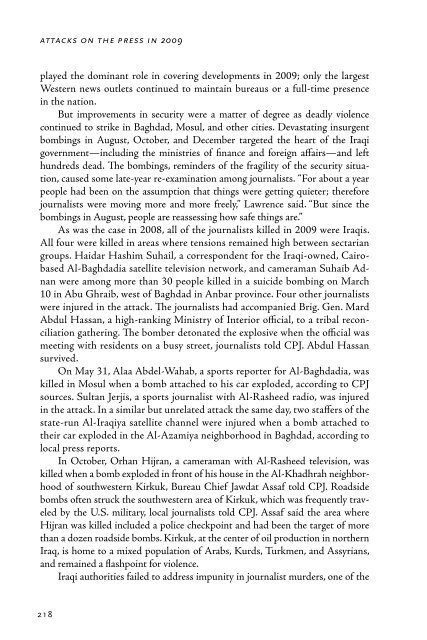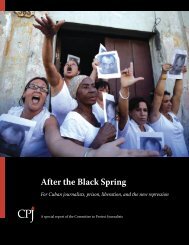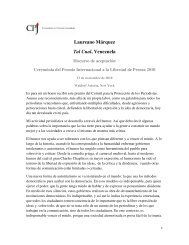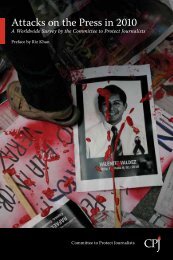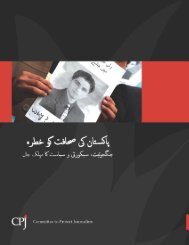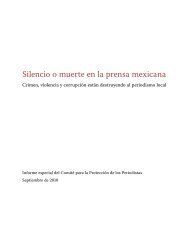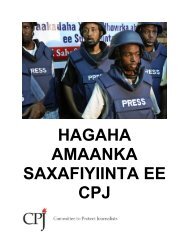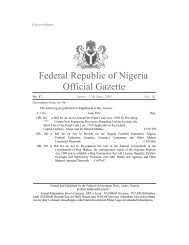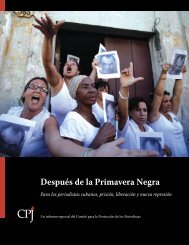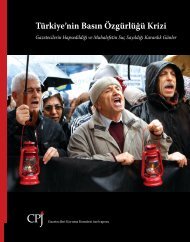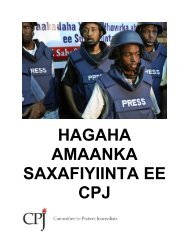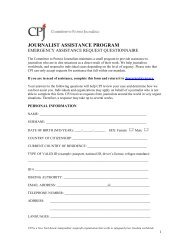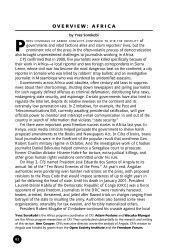Attacks on the Press - Committee to Protect Journalists
Attacks on the Press - Committee to Protect Journalists
Attacks on the Press - Committee to Protect Journalists
- No tags were found...
Create successful ePaper yourself
Turn your PDF publications into a flip-book with our unique Google optimized e-Paper software.
attacks <strong>on</strong> <strong>the</strong> press in 2009middle east and north africa: iraqplayed <strong>the</strong> dominant role in covering developments in 2009; <strong>on</strong>ly <strong>the</strong> largestWestern news outlets c<strong>on</strong>tinued <strong>to</strong> maintain bureaus or a full-time presencein <strong>the</strong> nati<strong>on</strong>.But improvements in security were a matter of degree as deadly violencec<strong>on</strong>tinued <strong>to</strong> strike in Baghdad, Mosul, and o<strong>the</strong>r cities. Devastating insurgentbombings in August, Oc<strong>to</strong>ber, and December targeted <strong>the</strong> heart of <strong>the</strong> Iraqigovernment—including <strong>the</strong> ministries of finance and foreign affairs—and lefthundreds dead. The bombings, reminders of <strong>the</strong> fragility of <strong>the</strong> security situati<strong>on</strong>,caused some late-year re-examinati<strong>on</strong> am<strong>on</strong>g journalists. “For about a yearpeople had been <strong>on</strong> <strong>the</strong> assumpti<strong>on</strong> that things were getting quieter; <strong>the</strong>reforejournalists were moving more and more freely,” Lawrence said. “But since <strong>the</strong>bombings in August, people are reassessing how safe things are.”As was <strong>the</strong> case in 2008, all of <strong>the</strong> journalists killed in 2009 were Iraqis.All four were killed in areas where tensi<strong>on</strong>s remained high between sectariangroups. Haidar Hashim Suhail, a corresp<strong>on</strong>dent for <strong>the</strong> Iraqi-owned, CairobasedAl-Baghdadia satellite televisi<strong>on</strong> network, and cameraman Suhaib Adnanwere am<strong>on</strong>g more than 30 people killed in a suicide bombing <strong>on</strong> March10 in Abu Ghraib, west of Baghdad in Anbar province. Four o<strong>the</strong>r journalistswere injured in <strong>the</strong> attack. The journalists had accompanied Brig. Gen. MardAbdul Hassan, a high-ranking Ministry of Interior official, <strong>to</strong> a tribal rec<strong>on</strong>ciliati<strong>on</strong>ga<strong>the</strong>ring. The bomber det<strong>on</strong>ated <strong>the</strong> explosive when <strong>the</strong> official wasmeeting with residents <strong>on</strong> a busy street, journalists <strong>to</strong>ld CPJ. Abdul Hassansurvived.On May 31, Alaa Abdel-Wahab, a sports reporter for Al-Baghdadia, waskilled in Mosul when a bomb attached <strong>to</strong> his car exploded, according <strong>to</strong> CPJsources. Sultan Jerjis, a sports journalist with Al-Rasheed radio, was injuredin <strong>the</strong> attack. In a similar but unrelated attack <strong>the</strong> same day, two staffers of <strong>the</strong>state-run Al-Iraqiya satellite channel were injured when a bomb attached <strong>to</strong><strong>the</strong>ir car exploded in <strong>the</strong> Al-Azamiya neighborhood in Baghdad, according <strong>to</strong>local press reports.In Oc<strong>to</strong>ber, Orhan Hijran, a cameraman with Al-Rasheed televisi<strong>on</strong>, waskilled when a bomb exploded in fr<strong>on</strong>t of his house in <strong>the</strong> Al-Khadhrah neighborhoodof southwestern Kirkuk, Bureau Chief Jawdat Assaf <strong>to</strong>ld CPJ. Roadsidebombs often struck <strong>the</strong> southwestern area of Kirkuk, which was frequently traveledby <strong>the</strong> U.S. military, local journalists <strong>to</strong>ld CPJ. Assaf said <strong>the</strong> area whereHijran was killed included a police checkpoint and had been <strong>the</strong> target of morethan a dozen roadside bombs. Kirkuk, at <strong>the</strong> center of oil producti<strong>on</strong> in nor<strong>the</strong>rnIraq, is home <strong>to</strong> a mixed populati<strong>on</strong> of Arabs, Kurds, Turkmen, and Assyrians,and remained a flashpoint for violence.Iraqi authorities failed <strong>to</strong> address impunity in journalist murders, <strong>on</strong>e of <strong>the</strong>many brutal legacies of <strong>the</strong> c<strong>on</strong>flict. Of <strong>the</strong> 140 journalists killed in Iraq since2003, at least 89 were targeted for murder. By year’s end, Iraqi authorities hadyet <strong>to</strong> bring a single killer <strong>to</strong> justice in any of those murders. Iraq ranked firstworldwide <strong>on</strong> CPJ’s Impunity Index, which calculates <strong>the</strong> number of unsolvedjournalist murders as a percentage of <strong>the</strong> nati<strong>on</strong>’s populati<strong>on</strong>.For many journalists, government harassment, assaults, and legal acti<strong>on</strong> supplanteddeadly insurgent violence as <strong>the</strong> most frequent work-related risk. “Officialsd<strong>on</strong>’t want journalists <strong>to</strong> write about things such as security issues, violati<strong>on</strong>sof human rights, lack of basic services, and corrupti<strong>on</strong>,” JFO direc<strong>to</strong>r al-Ajilisaid. “They are imposing restricti<strong>on</strong>s <strong>on</strong> journalists—and <strong>the</strong> directi<strong>on</strong> <strong>the</strong>y aretaking is more <strong>to</strong>ward authoritarianism.”Numerous journalists were harassed or assaulted by police during provincialelecti<strong>on</strong>s in late January, according <strong>to</strong> local and internati<strong>on</strong>al news reports. InBasra, guards at a correcti<strong>on</strong>al facility assaulted about 15 reporters and brokeequipment when voting started, local and internati<strong>on</strong>al news agencies reported.The guards claimed that pho<strong>to</strong>graphers had taken pictures of inmates’ faces, according<strong>to</strong> news reports.Iraqi officials also brought legal acti<strong>on</strong> against domestic and internati<strong>on</strong>aljournalists. In February, a lawyer for Prime Minister Nouri al-Maliki filed a lawsuitagainst Ayad al-Zamli, owner of <strong>the</strong> German-based Arabic Web site Kitabat,and a writer who had written under <strong>the</strong> pseud<strong>on</strong>ym of Ali Hussein, in c<strong>on</strong>necti<strong>on</strong>with an article describing alleged nepotism in <strong>the</strong> prime minister’s office.The lawsuit demanded 1 billi<strong>on</strong> dinars (US$865,380) in damages, according <strong>to</strong>a copy of <strong>the</strong> complaint. After local and internati<strong>on</strong>al outcry, al-Maliki withdrew<strong>the</strong> lawsuit in May.That same m<strong>on</strong>th, <strong>the</strong> Iraqi Nati<strong>on</strong>al Intelligence Service (INIS) filed a defamati<strong>on</strong>complaint against <strong>the</strong> L<strong>on</strong>d<strong>on</strong>-based Guardian newspaper for an articlein which sources characterized <strong>the</strong> prime minister as “increasingly au<strong>to</strong>cratic,” <strong>the</strong>paper reported. In November, in a move that drew c<strong>on</strong>demnati<strong>on</strong> from domesticand internati<strong>on</strong>al observers, a Baghdad court ordered <strong>the</strong> paper <strong>to</strong> pay 100 milli<strong>on</strong>dinars (US$86,000) in damages. The paper said it would appeal.One piece of legislati<strong>on</strong>, while ostensibly benefitting journalists, also raisedquesti<strong>on</strong>s. A journalist protecti<strong>on</strong> measure—written in c<strong>on</strong>juncti<strong>on</strong> with <strong>the</strong>Iraqi <strong>Journalists</strong>’ Syndicate and pending in late year—was designed <strong>to</strong> aid <strong>the</strong>press by providing compensati<strong>on</strong> for injured journalists, ensuring security forthose under threat, and ensuring <strong>the</strong> right <strong>to</strong> obtain government informati<strong>on</strong>.But local and internati<strong>on</strong>al press freedom advocates expressed c<strong>on</strong>cerns aboutseveral provisi<strong>on</strong>s in <strong>the</strong> draft. One article, for example, narrowly defined a journalistas some<strong>on</strong>e who both works for an established news outlet and is affiliatedwith <strong>the</strong> Iraqi <strong>Journalists</strong>’ Syndicate. The provisi<strong>on</strong> was seen by some as imposing218219


